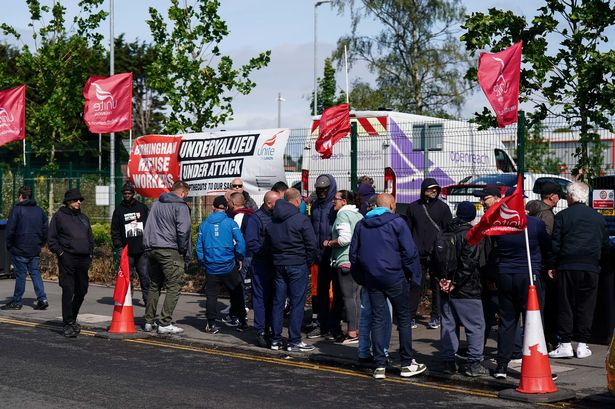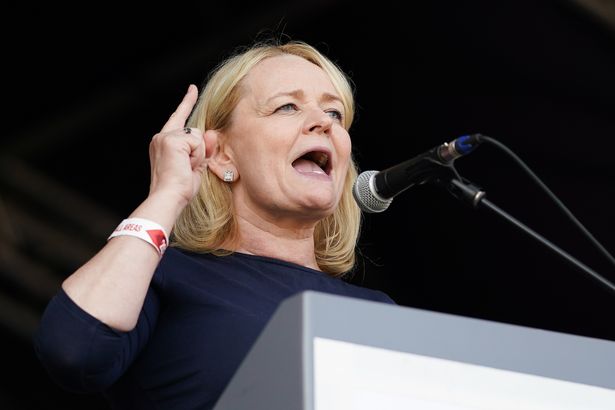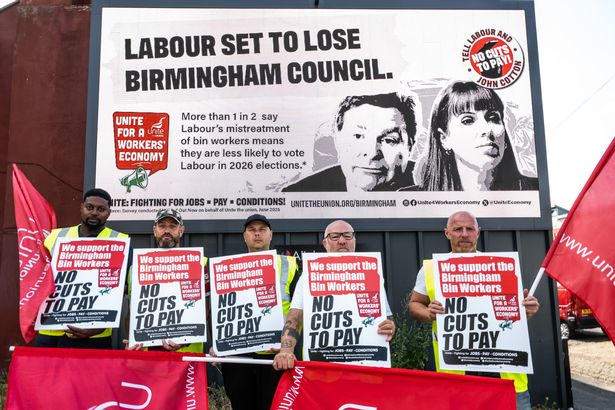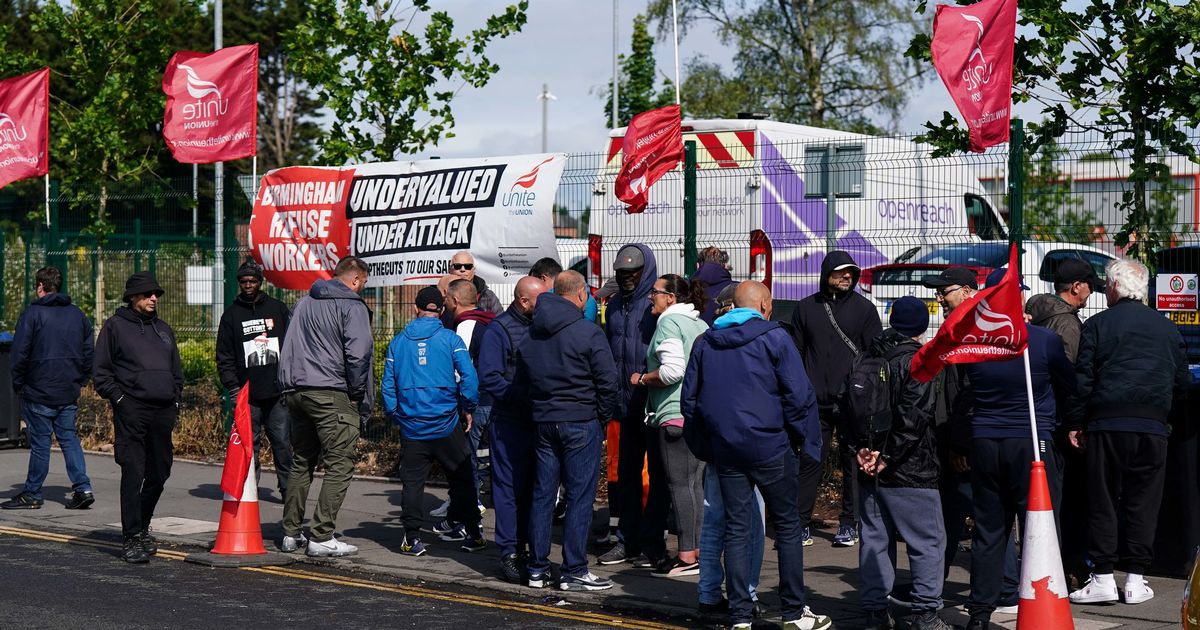Birmingham City Council and the bins union Unite are each refusing to back down in bitter dispute with court action and recrimination Striking refuse workers outside Perry Barr depot in Birmingham
Striking refuse workers outside Perry Barr depot in Birmingham
The bitter bin dispute that has blighted Birmingham all year today reached a sorry landmark. It is exactly six months since bin workers downed tools indefinitely – and the two sides involved are further apart than ever.
Legal action and bitter public statements over who is to blame make the prospect of an agreed resolution between Birmingham City Council and the union Unite ‘very unlikely’, say insiders.
The two sides are no longer talking to each other in a meaningful way aimed at reaching a compromise agreement.
READ MORE: Birmingham bins boss quizzed over city’s ‘appalling’ recycling rates
Members of the Unite union recently voted to extend their industrial action until March 2026, accusing the council of being underhand, trampling on workers’ rights and being dictated to by the Government and its appointed commissioners over what to do.
Meanwhile the city council has maintained it has ‘reached the absolute limit’ of what it could offer and has launched a PR offensive claiming the kerbside collection service for residents is better now than pre-strike, with more rubbish picked up and fewer missed collections.
But there has also been a massive environmental impact. Roadside collections of recycling have been halted throughout the six months of all-out strike, with residents told to put recycling into their black bins or bags, or take it to the tips themselves.
As a result thousands of tonnes of recyclables have ended up being incinerated. The council’s recycling rate has plummeted to just 15 per cent, according to latest figures.
A rally in the city has been announced in support of the strikers. It will take place on September 20. Unite general secretary Sharon Graham said the workers were “resolute” about continuing industrial action.
 Unite the Union general secretary, Sharon Graham, has been at the centre of the bin dispute (Image: Ian Forsyth/Getty Images)
Unite the Union general secretary, Sharon Graham, has been at the centre of the bin dispute (Image: Ian Forsyth/Getty Images)
She told the PA news agency that the dispute was affecting Unite’s relationship with the Labour Party and the Government. She is currently considering whether to maintain Unite’s powerful links and financial affiliation with the Labour party, and has said the actions of a Labour council and the government in the Birmingham dispute had been a contributory factor.
“Our members are resolute in their determination to win this dispute and are disgusted at the behaviour of the Labour council and the Labour Government.”
The council recently revealed it was taking legal action over claims striking workers under the Unite banner had broken an injunction setting out strict rules about how pickets could behave and where they could stand outside the bin depots.
The council claimed the injunction had been contravened in ways that prevented bin trucks getting out safely to collect rubbish. Unite said that if the union is fined, the money would be paid out of its Labour affiliation fund.
In a statement this week, Birmingham City Council said it was disappointed that the dispute had not been resolved, and said this was because Unite had rejected all its offers.
“We are continuing to make regular waste collections as we prepare to implement a new and improved service,” it told BirminghamLive.
“This is a service that has not been good enough for too long so it needs to be transformed to one that citizens of Birmingham deserve – we cannot delay this any longer.
“Although the industrial action continues, our contingency plan is working and we are collecting household waste as scheduled.”
 Birmingham bin workers are protesting over proposed pay cuts and say Labour are set to lose control of Birmingham City Council next year (Image: Guy Smallman/Getty Images)
Birmingham bin workers are protesting over proposed pay cuts and say Labour are set to lose control of Birmingham City Council next year (Image: Guy Smallman/Getty Images)
It said its new fleet of vehicles was fully operational and making collections. The vehicles are equipped with modern safety features, including 360-degree camera systems to boost visibility and protect crews and the public. They also contain ‘eye in the cab’ technology to help office-based staff monitor rounds and alert missed collections.
The council also intimated the service had improved during the strike – with the workforce that includes agency staff doing a better job than the permanent crews.
“We have been collecting an average of approximately 1,330 tonnes of kerbside waste every day, more than we did prior to industrial action, and over the last six months we have collected over 100,000 tonnes of kerbside waste.
“There has been a 22 per cent increase in tonnage of waste collected per employee, and a 52 per cent improvement regarding missed collections.
“We want to see this dispute end, we understand residents’ frustration and appreciate their patience over the last few months.”
The dispute kicked off at the end of last year when the city council confirmed its intention to ‘delete’ the role of a senior position on its bin trucks, called a Waste Recycling Collections Officer, as part of its plans to transform the under-performing service.
Around 170 staff were affected, with some offered to be redeployed to other services and some offered the chance to retrain as drivers – at the time a higher graded role.
But plans to downgrade the status and pay of the bin truck drivers later emerged and triggered a new wave of fury among waste service staff. Some of those who had undergone retraining claimed they had been duped.
The situation escalated again until in July the council said it had “reached the absolute limit” of what it could offer and walked away from talks.
Formal redundancy consultations with workers who had rejected alternative proposals are now under way and close to a conclusion. It means affected workers are now at risk of being forced out of their jobs, whether they like it or not. What happens next remains uncertain.
Press Association industrial correspondent Alan Jones said: “There has to be a compromise, probably on both sides. There has to be talks, they have to get back together again, either with or without the conciliation service Acas, and reach some kind of deal.
“I don’t think there’ll be an outright winner from this,” he added. “There rarely is when a strike starts.
“Unless something happens, unless there’s a breakthrough, unless there’s a deal I think it’s virtually certain that this dispute will just carry on and on.”
Strike timeline
19 December 2024 – More than 350 bin workers vote for industrial action
6 January 2025 – Occasional bin strikes start, with 12 days of action planned between January and April
3 February – Extra strike days are added with 12 more days in February and 13 days in March
11 March – The indefinite all-out strike begins
31 March – birmingham -city-council>Birmingham City Council declares a major incident
4 April – Residents rely on mobile rubbish collection points in the city, some with queues of up to a mile.
5 April – Former deputy prime minister, Angela Rayner, meets council leaders to discuss ways to clear the “waste backlog”
13 April – Military planners are brought in to help tackle mounting rubbish
14 April – Latest deal by Birmingham City Council is rejected by Unite, the strike continues
1 May – The council and union enter mediation talks, alongside conciliation service Acas
8 May – Castle Bromwich recycling centre’s booking system is suspended as part of a trial to allow flexibility for residents
9 May – A “megapicket” is formed at the Lifford Lane refuse depot in Kings Norton
15 May – Bin lorries are blocked by striking workers at the Atlas depot in Tyseley
5 June – Unite says the strike could continue until December, after members voted to continue
9 July – Talks to resolve the strike have broken down, and some bin lorry drivers are at risk of compulsory redundancy
15 July – Council chiefs say actions on the picket line have delayed rubbish collections
2 September – Unite says its members “overwhelmingly” voted to extend the action to March 2026
9 September – Bin workers stage a protest outside an employment agency over the authority’s use of agency workers
